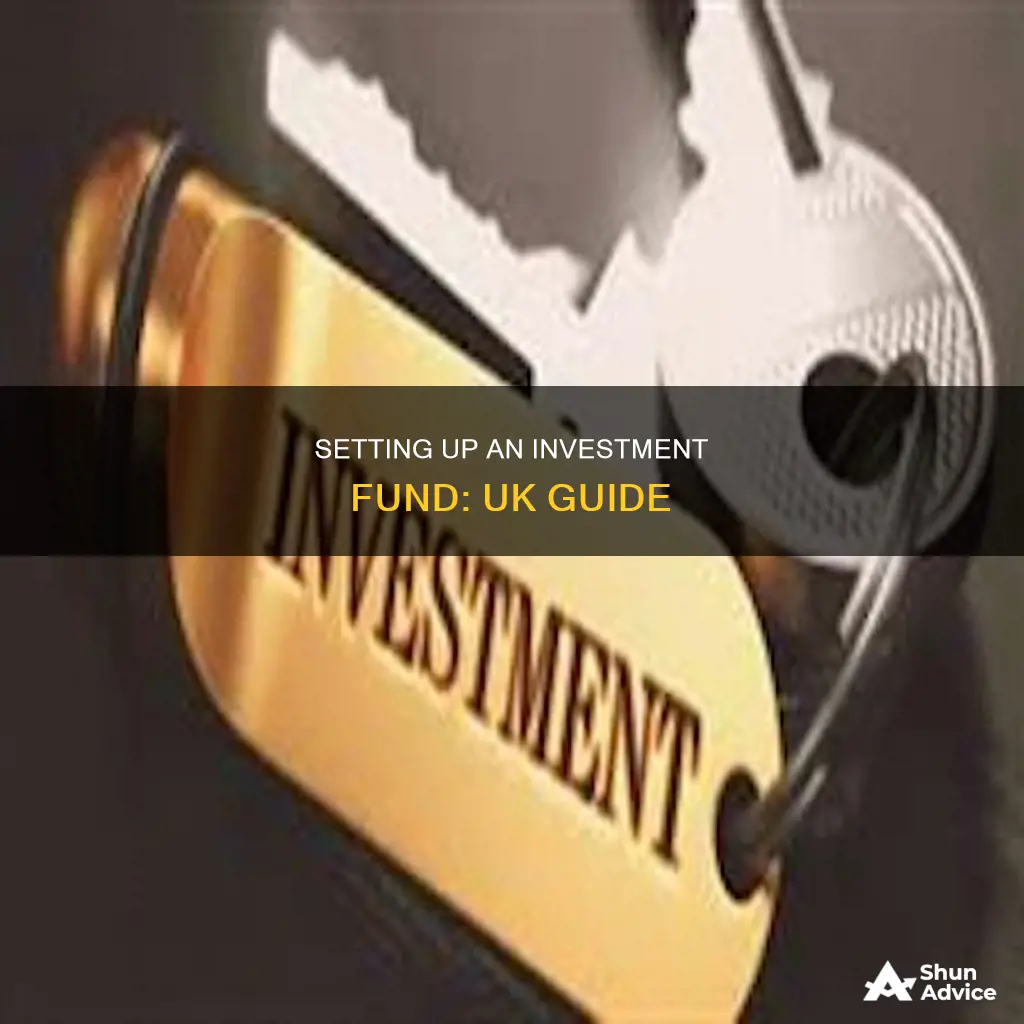
Setting up an investment fund in the UK involves several key steps and considerations. Firstly, it's important to understand the different types of investment options, such as open-ended and closed-ended funds, as well as the associated risks and regulations. This includes registering with the Financial Conduct Authority (FCA), meeting capital requirements, and complying with tax regulations. Choosing the right structure for your fund, such as the legal entity, share classes, and tax status, is also crucial. It is recommended to seek expert advice to ensure compliance with all relevant laws and to avoid potential pitfalls. Additionally, assembling a competent team, including investment managers, financial advisors, and lawyers, is essential for the successful establishment and operation of your investment fund.
| Characteristics | Values |
|---|---|
| Types of investment funds | Open-ended, closed-ended, hedge funds, venture capital funds, SLPs |
| Requirements and regulations | Registering with the FCA, minimum capital, listing on a stock exchange, custodian bank, depositary |
| Investment fund structure | Legal entity, share classes, tax status |
| Investment fund considerations | Investment strategy, type of investors, fund size, fund structure, taxation, regulations and requirements |
| Investment fund costs | Professional fees, regulatory compliance, marketing costs |
| Investment fund team | Investment managers, financial advisors, lawyers |
| Investment fund authorisation | Authorised by FCA, authorised contractual scheme (ACS), authorised unit trust (AUT), investment company with variable capital (ICVC) |
| Investment fund documentation | Application form, supporting documents, draft contractual scheme deed, solicitor's certificate, trust deed, instrument of incorporation, prospectus, model portfolio, key investor information document |
| Investment fund fees | Application fees, periodic fees |
What You'll Learn

Understand the different types of investment funds
Understanding the different types of investment funds is crucial when setting up an investment fund in the UK. Here is an overview of the various types of investment funds available:
Open-ended and Closed-ended Funds
One of the fundamental distinctions between investment funds is whether they are open-ended or closed-ended. Open-ended funds offer investors the flexibility to buy and sell units at any time. This accessibility makes them a popular choice for those who want to enter or exit the investment whenever they wish. On the other hand, closed-ended funds have a fixed number of units that are traded only on a stock exchange, providing a more stable structure.
Hedge Funds and Venture Capital Funds
Hedge funds employ aggressive trading strategies to generate active returns for investors. They often involve higher risks and are typically accessible only to accredited investors with substantial capital. Hedge funds are highly regulated in the UK, with managers needing approval from the Financial Conduct Authority (FCA) to operate.
Mutual Funds and Exchange-Traded Funds (ETFs)
Mutual funds, also known as investment funds or active funds, are a type of investment vehicle where money is pooled from multiple investors to purchase a diverse range of assets, including shares, bonds, and property. This diversification helps spread the risk and provides access to a broader range of investments than individual investors might achieve alone. Exchange-Traded Funds (ETFs) are similar in that they provide exposure to a wide range of assets, but they are traded on stock exchanges like individual stocks, offering greater flexibility in buying and selling throughout the trading day.
Index Funds
Index funds, or tracker funds in the UK, aim to replicate the performance of a specific market index, such as the FTSE 100. Rather than trying to outperform the market, these funds aim to match its returns. This passive investment strategy often results in lower fees compared to actively managed funds, making them a cost-effective way to achieve diversification.
Individual Savings Accounts (ISAs)
ISAs are a popular investment vehicle in the UK, offering tax-efficient savings accounts. They allow individuals to invest up to a certain annual limit without paying tax on interest or capital gains. There are several types of ISAs, including Cash ISAs, Stocks and Shares ISAs, Lifetime ISAs (LISAs), and Innovative Finance ISAs (IFISAs), each with its own unique features and benefits.
Self-Invested Personal Pensions (SIPPs)
SIPPs are a type of personal pension that offers individuals greater control over their retirement savings. They provide a wide range of investment choices, including shares, bonds, funds, and even commercial property. SIPPs are designed as long-term investment vehicles, with access typically restricted until a certain age to encourage retirement savings.
Real Estate Investment Trusts (REITs)
REITs provide individuals with an opportunity to invest in income-generating real estate without directly owning any property. They invest in residential, commercial, or specialist properties and are required to distribute a majority of their taxable income to shareholders, making them attractive for those seeking regular income.
Other Investment Options
In addition to the above, there are other investment options available in the UK, such as fixed-interest savings accounts, easy access accounts, regular saver accounts, and notice savings accounts, each with its own risk-return profile and level of liquidity.
Parag Parikh Flexi Cap Fund: Smart Investing Strategies
You may want to see also

Know the requirements and regulations
Setting up an investment fund in the UK requires a comprehensive understanding of the requirements and regulations involved. Here is a detailed overview of the key points to consider:
Regulatory Bodies and Registration:
- Financial Conduct Authority (FCA): Your investment fund will need to be authorised and registered with the FCA, the primary regulatory body overseeing financial services in the UK. They will review your application and may take up to six months to provide approval. The FCA will assess your financial resources, staff, systems, and controls to ensure they meet the necessary standards.
- Financial Services and Markets Act 2000: This legislation governs the authorisation and regulation of investment funds, including Authorised Investment Funds (AIFs) and collective investment schemes.
Investment Fund Types and Structures:
- Open-ended vs. Closed-ended Funds: Open-ended funds allow investors to buy and sell units at any time, while closed-ended funds have a fixed number of units traded on a stock exchange.
- Hedge Funds: These funds employ aggressive trading strategies to generate active returns but are subject to higher regulatory requirements and are typically only available to accredited investors.
- Authorised Unit Trusts (AUTs): AUTs are regulated investment funds authorised by the FCA, similar to Open-ended Investment Companies (OEICs). They are established under the Financial Services and Markets Act 2000 and held in trust for the benefit of investors.
- Investment Company with Variable Capital (ICVC): ICVCs are another type of investment fund structure that requires authorisation from the FCA.
- Alternative Investment Fund Managers Directive (AIFMD): NURS, QIS, and LTAF funds are subject to additional requirements under this directive, which governs how hedge funds can market and solicit their assets.
Capital Requirements and Fees:
- Minimum Capital: Ensure you have the minimum amount of capital required for your investment fund type. For example, the FCA mandates a minimum capital of £50,000 for open-ended funds and £250,000 for closed-ended funds.
- Application and Periodic Fees: Be prepared to pay application fees when submitting your investment fund application to the FCA. Once authorised, your fund will also be subject to periodic fees.
- Tier 1 Capital: Your company must maintain a certain level of Tier 1 Capital, which is shareholders' equity that cannot be used for operational purposes. This requirement ensures the company can survive and return funds to investors if things go wrong.
Key Roles and Appointments:
- CF30 Role: Appoint someone qualified to run your investment fund, ideally yourself or an employee with the necessary experience and knowledge as recognised by the FCA. This role is crucial for the day-to-day management of the fund.
- Compliance and Money Laundering Officer (CF10): Assign a Compliance and/or Money Laundering Officer to ensure adherence to regulatory requirements. This person will be responsible if issues arise with the FCA.
- Compliance Officer: Appoint a Compliance Officer to oversee compliance with internal policies and external regulations.
- Authorised Corporate Director (ACD): An ACD is responsible for operating the investment fund and can be an external company providing back-office services for a fee.
- Depositary: A depositary consists of a trustee, who ensures proper management, and a custodian, who holds cash and securities on your behalf. The FCA requires the appointment of a depositary to safeguard investments.
Other Considerations:
- Business Plan: Prepare a comprehensive business plan explaining how your investment fund will operate, endorsed by a qualified accountant and submitted to the FCA by a lawyer.
- Office and Operations: Establish an office with the necessary equipment and a business contingency plan. You will also need data feeds for news and price information on the securities you plan to invest in.
- Broker and Service Providers: Engage a broker to perform due diligence and ensure the legitimacy of your operations. Additionally, you will need to hire lawyers, accountants, and bookkeepers as part of your support team.
- Investor Relations: Building relationships with intermediaries, such as Independent Financial Advisors (IFAs) or platforms, is essential for reaching potential investors. These intermediaries often have specific requirements, such as fund size, track record, and ratings, before promoting your fund to their clients.
Remember, this is a complex process, and it is advisable to consult with financial and legal experts throughout to ensure compliance with all relevant regulations.
Emergency Fund Strategies: UK Investment Options for Peace of Mind
You may want to see also

Choose the right structure
Choosing the right structure for your investment fund is a critical step in the setup process. This decision will depend on various factors, such as the size of your fund, your investment strategy, and your risk appetite. Here are some key considerations to help you choose the appropriate structure:
- Legal Entity: The legal entity you choose will impact the level of regulation and investor protection. In the UK, common structures include authorised contractual schemes (ACS), authorised unit trusts (AUT), and investment companies with variable capital (ICVC). Each structure has specific requirements and regulations that need to be followed.
- Share Classes: Consider the different share classes you want to offer to investors. This can include management and investment share classes, with management shares typically holding voting rights while investment shares are non-voting. You can also create different share classes to cater to specific investor needs, such as tax status, leverage restrictions, and voting rights.
- Tax Status: Understand the tax implications of different structures. For example, OEICs (open-ended investment companies) offer a beneficial tax regime with no tax on capital gains from investments. In contrast, FICs (family investment companies) are subject to the standard UK tax regime for companies, which can vary depending on shareholder composition and profit levels.
- Investment and Borrowing Powers: Different structures have varying restrictions on the types of assets they can hold and their borrowing capabilities. For instance, OEICs must comply with strict FCA rules on investment and borrowing, while FICs offer more flexibility in this regard.
- Investor Rights and Control: Determine how much control and rights you want to grant to investors. In authorised funds, different share classes can be offered, but the FCA rules prohibit prejudice to other shareholders. FICs, on the other hand, can be tailored to provide different shareholder rights and controls.
- Public Registers: Consider the level of transparency and public disclosure required for your fund. OEICs are listed on the Financial Services Register, along with officeholders and shareholder information. FICs, as private limited companies, disclose director, shareholder, and person-with-significant-control information to Companies House.
- Costs and Fees: Evaluate the costs and fees associated with each structure. For example, OEICs and AUTs have regulatory approval, oversight, and scrutiny costs, while FICs may have higher costs associated with private company registration and ongoing compliance.
Remember, it is essential to seek expert advice when choosing the right structure for your investment fund. Consult with legal and financial professionals to ensure you make an informed decision that aligns with your specific needs and requirements.
A Smart Guide to Investing in Low-Fee Index Funds
You may want to see also

Consider the costs
Setting up an investment fund in the UK can be a costly endeavour, so it's important to carefully consider the costs involved. Here are some key points to keep in mind:
Initial Capital Requirements
To establish an investment fund in the UK, you will need to meet certain capital requirements. The Financial Conduct Authority (FCA) sets the minimum capital requirements for different types of funds. For example, the FCA requires a minimum capital of £50,000 for open-ended funds and £250,000 for closed-ended funds. These funds cannot be touched and must be kept as regulatory capital to protect investors in case things go wrong.
Operational Costs
Running an investment fund also incurs ongoing operational costs. These include expenses such as professional fees for investment managers, financial advisors, lawyers, and other experts. You will also need to budget for regulatory compliance costs, marketing and promotion, office space, technology, and data feeds for news and price information. Don't forget to factor in the costs of running your day-to-day operations, such as salaries, office supplies, and other administrative expenses.
Depositary and Custodian Fees
As mentioned earlier, the FCA requires you to appoint a depositary, which consists of a trustee and a custodian. The trustee oversees the operation and ensures proper management, while the custodian holds and safeguards the cash and securities on your behalf. Both of these roles come with associated fees, which can be significant.
Platform Fees
If you plan to use investment platforms to reach potential investors, be prepared for additional costs. These platforms often charge fees for hosting your fund, and they may have requirements such as minimum fund size, a track record of performance, and expressions of interest from intermediaries.
Regulatory Fees
When applying for fund authorisation, you will need to pay application fees to the FCA. Additionally, authorised funds are subject to periodic fees, which are outlined in the FCA's fees manual. These regulatory fees are an ongoing cost that you need to factor into your budget.
Other Costs
There may be other costs that are specific to your fund's structure and operations. For example, if you choose to outsource certain functions to an Authorised Corporate Director (ACD), you will need to pay for their services. You may also need to budget for due diligence checks, business insurance, and other compliance-related expenses.
Remember that the costs of setting up and running an investment fund can vary widely depending on the type of fund, its size, and your chosen structure. It is always a good idea to consult with experts and seek specific advice for your particular situation.
Public PE Fund: Exploring Alt Investment Opportunities
You may want to see also

Get the right team
Setting up an investment fund in the UK requires a team of professionals with specific roles and qualifications. Here are some key considerations for getting the right team in place:
Investment Managers and Compliance Officers
Appoint qualified investment managers or individuals with the necessary experience and knowledge to run your fund. In the UK, the Financial Conduct Authority (FCA) recognises this role as CF30. It is essential to have a backup investment manager or a locum who can fill in during absences or leave. Additionally, ensure you have a Compliance and/or Money Laundering Officer, known as the CF10 function, who understands the regulatory requirements and can ensure your fund operates within legal boundaries.
Authorised Corporate Director (ACD) and Trustee/Depositary
For certain types of funds, such as open-ended investment companies (OEIC) or authorised unit trusts (AUT), you will need to appoint an ACD, who is responsible for operating the fund. The ACD can be an authorised financial services firm or an individual with the relevant qualifications and experience. For AUTs, the equivalent role is a manager. Additionally, you will need a trustee (for AUTs) or a depositary, who is responsible for oversight and custody of the fund's assets. The depositary consists of two roles: a trustee and a custodian. The trustee ensures proper management, while the custodian holds and safeguards the cash and securities on your behalf.
Legal and Tax Advisors
Engage legal counsel to guide you through the complex regulatory and tax environment of investment funds. They can advise on the legal structure, compliance with FCA rules, and the tax implications of your fund. Additionally, consider appointing tax advisors to ensure you meet all tax obligations and optimise your tax position.
Brokers and Service Providers
Select a broker who will perform due diligence on your fund to ensure legitimacy and compliance with anti-money laundering regulations. You will also need to assemble a team of service providers, including accountants, bookkeepers, and potentially an external company to assist with establishing and maintaining compliance with laws and regulations.
Fund Distributors and Intermediaries
To reach potential investors, you will need to engage intermediaries such as independent financial advisors (IFAs) or platforms. These intermediaries will have their own requirements and fees, so be prepared to meet their criteria and compensate them for their services. Remember that fund managers are typically not allowed to provide financial advice or directly solicit business from the public due to FCA regulations.
Retirement Investing: Index Funds for Secure Financial Future
You may want to see also
Frequently asked questions
There are two main types of investment funds: open-ended and closed-ended. Open-ended funds allow investors to buy and sell units at any time, while closed-ended funds have a fixed number of units that are only traded on a stock exchange. Other less common types of investment funds include hedge funds and venture capital funds.
Investment funds in the UK must be authorised by the Financial Conduct Authority (FCA) and comply with various requirements and regulations. These include registering with the FCA, having a minimum amount of capital, listing units on a stock exchange, appointing a custodian bank and a depositary, and complying with specific tax regulations.
To apply for fund authorisation in the UK, you must submit an application to the FCA along with relevant supporting documents and information. The specific application form and requirements depend on the type of fund being established. Application fees and periodic fees may apply, and it is important to provide accurate and complete information to ensure a smooth review process.







